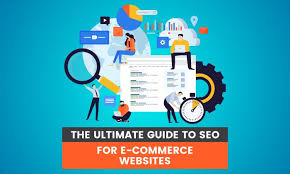The Ultimate Ecommerce SEO Strategy Guide
For ecommerce businesses, implementing a robust SEO strategy is paramount to driving organic traffic and increasing sales. With the ever-growing competition in the online marketplace, having a well-defined SEO plan can make all the difference in attracting potential customers and standing out from the crowd.
Keyword Research and Analysis
The foundation of any successful ecommerce SEO strategy is thorough keyword research. Identify relevant keywords that your target audience is searching for and incorporate them strategically into your product descriptions, category pages, and meta tags. Use tools like Google Keyword Planner or SEMrush to discover high-volume, low-competition keywords that can boost your search engine rankings.
Optimise Product Pages
Each product page on your ecommerce site should be optimised for search engines. Write unique and compelling product descriptions that not only showcase the features of the item but also include relevant keywords. Optimise product images with descriptive alt text and ensure fast loading times to enhance user experience and improve search rankings.
Create High-Quality Content
Content is king in the world of SEO. Develop a blog or resource section on your ecommerce site where you can publish informative articles, how-to guides, and industry insights. By creating valuable content that resonates with your target audience, you can attract more organic traffic, establish authority in your niche, and encourage repeat visits to your site.
Build Quality Backlinks
Backlinks from reputable websites are a crucial aspect of any ecommerce SEO strategy. Reach out to industry influencers, bloggers, and publications to secure backlinks to your site. Guest posting on relevant sites and participating in online forums can also help build a strong backlink profile that signals credibility to search engines.
Optimise for Mobile
In today’s mobile-first world, it’s essential to ensure that your ecommerce site is optimised for mobile devices. Google prioritises mobile-friendly websites in its search results, so make sure your site loads quickly on smartphones and tablets, has responsive design elements, and offers a seamless shopping experience across all devices.
Monitor Performance and Adapt
SEO is an ongoing process that requires constant monitoring and adaptation. Use tools like Google Analytics and Search Console to track key metrics such as organic traffic, keyword rankings, and conversion rates. Analyse this data regularly to identify areas for improvement and refine your ecommerce SEO strategy for optimal results.
By following these essential steps and staying abreast of the latest SEO trends, you can develop a comprehensive ecommerce SEO strategy that drives traffic, boosts sales, and propels your online store to success.
Top 5 FAQs on Crafting an Effective Ecommerce SEO Strategy
- 1. What is ecommerce SEO and why is it important for online businesses?
- 2. How can keyword research benefit my ecommerce SEO strategy?
- 3. What are the best practices for optimising product pages for search engines?
- 4. How do backlinks contribute to the success of an ecommerce SEO strategy?
- 5. What role does mobile optimisation play in improving ecommerce SEO performance?
1. What is ecommerce SEO and why is it important for online businesses?
Ecommerce SEO, or search engine optimisation for ecommerce websites, is the practice of enhancing a digital store’s online visibility and ranking in search engine results pages. It involves implementing various strategies such as keyword optimisation, content creation, and link building to attract organic traffic and improve the chances of potential customers discovering the online store. Ecommerce SEO is crucial for online businesses as it helps drive targeted traffic to their websites, increase brand awareness, and ultimately boost sales. By optimising their ecommerce sites for search engines, businesses can reach a wider audience, outperform competitors, and establish a strong online presence in an increasingly competitive digital marketplace.
2. How can keyword research benefit my ecommerce SEO strategy?
Keyword research plays a pivotal role in shaping the success of your ecommerce SEO strategy. By conducting thorough keyword research, you gain valuable insights into the specific search terms and phrases that potential customers are using to find products or services similar to yours. By strategically incorporating these keywords into your website content, product descriptions, and meta tags, you can improve your search engine rankings and attract targeted organic traffic. Effective keyword research not only enhances visibility but also helps you understand customer intent, allowing you to tailor your offerings to meet their needs more effectively. In essence, keyword research acts as the compass guiding your ecommerce SEO strategy towards greater online visibility and increased conversions.
3. What are the best practices for optimising product pages for search engines?
When it comes to optimising product pages for search engines in ecommerce SEO strategy, several best practices can significantly impact your online visibility and drive relevant traffic to your site. Firstly, conducting thorough keyword research to identify and incorporate relevant keywords into product titles, descriptions, and meta tags is crucial. Additionally, ensuring that product images are optimised with descriptive alt text and high-quality visuals can enhance user experience and search engine rankings. Structuring product pages with clear headings, bullet points, and engaging content can also improve readability and SEO performance. Lastly, implementing schema markup to provide search engines with additional context about your products can further boost your visibility in search results. By following these best practices, you can effectively optimise your product pages for search engines and increase your chances of attracting potential customers to your ecommerce site.
4. How do backlinks contribute to the success of an ecommerce SEO strategy?
Backlinks play a pivotal role in the success of an ecommerce SEO strategy by enhancing the authority and credibility of a website in the eyes of search engines. When reputable websites link back to an ecommerce site, it signals to search engines that the site is a trusted source of information or products within its industry. This not only improves the site’s search engine rankings but also drives more organic traffic as users are more likely to click on links from respected sources. By securing quality backlinks from relevant and authoritative websites, ecommerce businesses can boost their online visibility, attract potential customers, and ultimately increase sales.
5. What role does mobile optimisation play in improving ecommerce SEO performance?
Mobile optimisation plays a critical role in enhancing ecommerce SEO performance. With the increasing number of consumers shopping on mobile devices, search engines like Google prioritise mobile-friendly websites in their rankings. By ensuring that your ecommerce site is optimised for mobile, you not only provide a seamless shopping experience for users but also improve your chances of ranking higher in search results. Mobile-friendly sites load faster, have responsive design elements, and offer easy navigation, all of which contribute to better user engagement and increased conversions. Ignoring mobile optimisation can lead to lower search rankings, decreased traffic, and missed opportunities for sales growth in the competitive ecommerce landscape.




